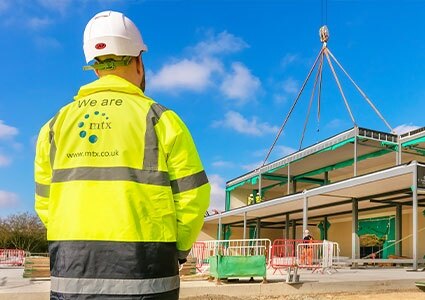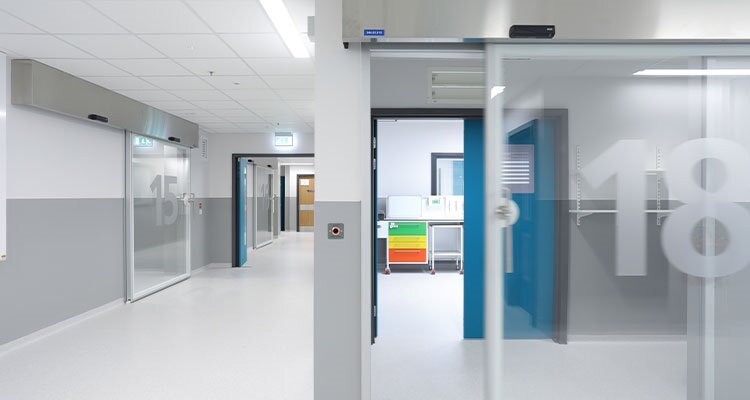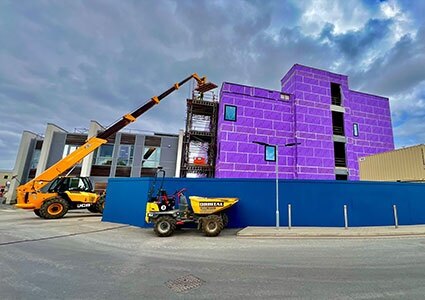Discover how MTX Contracts is revolutionising construction with innovative modern methods
MTX Contracts Ltd (MTX) is a well-established, privately-owned construction company renowned for its use of modern methods of construction (MMC) to deliver complex built environments to the NHS and other private healthcare clients. Dedicated to providing state-of-the-art, sustainable construction and engineering projects, MTX incorporates the highest levels of quality, in-house innovation, and engineering capabilities into its products and services. At MTX, customers are the top priority and play a vital role in every business decision. Equally, the company is committed to the continuous development of its employees and fostering lasting relationships with its supply chain partners. David Hartley, Managing Director, provides a brief introduction to the business.
 “Established in 2002 by my father and I, MTX originally specialised in the construction and remodelling of operating theatres. However, in recent years, our involvement has expanded to encompass larger and more complex hospital extensions. This includes the construction of wards, endoscopy units, A&E departments, intensive care units, critical care departments, and various other facilities,” he enlightens.
“Established in 2002 by my father and I, MTX originally specialised in the construction and remodelling of operating theatres. However, in recent years, our involvement has expanded to encompass larger and more complex hospital extensions. This includes the construction of wards, endoscopy units, A&E departments, intensive care units, critical care departments, and various other facilities,” he enlightens.
Tailored solutions
Delving into the nature of MTX’s current endeavours, David describes the company’s operating process. “Throughout all our projects, we leverage multiple elements of MMC framework, such as volumetric buildings, pre-manufactured mechanical, electrical, and plumbing (MEP) systems, wall panels and concrete solutions, as well as site augmentation. Our involvement in projects often begins at an early stage, sometimes as early as Stage 1 of the Royal Institute of British Architects (RIBA) Plan of Work. During this stage, we focus on proactively identifying cost programmes, and supporting clients with the outline business case and full business case. Subsequently, we progress into construction at RIBA Stage 4. Moreover, we have a dedicated aftercare team that supports our clients, particularly during soft landings, handover, and with maintenance throughout the building’s lifespan,” he unveils.
To ensure the successful completion of its projects, MTX collaborates closely with architects and other parties. “Early engagement with our clients and stakeholders is essential to truly understand their ambitions. Hence, our professional teams of architects, engineers, consultants, and more work in conjunction with the NHS Trust to grasp their aspirations and provide tailored solutions that meet their exact requirements. In other words, MTX buildings are built around the unique desire of our clients rather than standardised layouts, making collaboration a key aspect of our approach. Throughout the process, we foster constant communication by conducting workshops at every stage to ensure that client needs are met. Whether it involves structural preferences, interior design, biophilic elements, or any other specifications, we strive to go above and beyond in fulfilling our clients’ expectations,” explains David.
Recently, MTX secured a contract at Frimley Park Hospital. David tells us more about what the project entails. “Our current undertaking at Frimley Park Hospital represents a significant innovation in healthcare construction delivery. The state-of-the-art three-storey building will accommodate a dedicated breast care diagnostic and outpatient unit, along with an advanced imaging centre. This development will enhance both capacity and capabilities to deliver improved patient care quality. By using MMC principles, we anticipate reducing our build schedule by up to 50 per cent compared to traditional building methods, while also aiming to minimise waste by up to 60 per cent through off-site manufacturing techniques. Importantly, MTX is carefully managing the project to ensure minimal disruption to patient care at Frimley Park Hospital throughout the construction process,” he adds.
Modern methods 
In parallel, MTX is involved in an important project nearing completion at Colchester Hospital. “With a capital value of over £50 million, this remarkable development is set to be one of the largest orthopaedic centres in Europe, once complete. In fact, it is the largest healthcare development of its kind in the UK which was built using MMC. As we approach its completion later this year, we seek to invite our clients to visit the facility prior to its opening. A total of 293 structural steel units were manufactured offsite and used to construct the building, which is expected to house eight additional operating theatres. Regarding the timeline, MTX has delivered the project at an exceptional pace, with a remarkably short pre-construction phase and a substantially reduced construction period compared to traditional methods, all while maintaining a competitive price point. This flagship scheme serves as a benchmark of what NHS Trusts are looking to achieve in terms of new clinical requirements across the country,” David highlights.
On that note, David expresses why he believes modern methods of construction (MMC) are more advantageous than traditional methods. “To begin with, MMC enables quicker construction, given that many of the tasks in the process are handled in parallel offsite, thereby optimising time resources and speeding up the project timeline. Constructing our buildings offsite reduces potential disruptions, which is particularly crucial in busy hospital settings as it ensures uninterrupted patient pathways and operations. Furthermore, MMC contributes to a greater reduction in carbon emissions by decreasing the need for frequent vehicle movements. By adopting local labour, we significantly reduce the number of people travelling long distances across the country. Consequently, when the MMC products arrive onsite, they can be efficiently assembled in situ, ensuring complete compliance of the building,” he elaborates.
Sustainable growth
Looking ahead, David reveals his vision for the future of the company. “Anticipated revenue for the year is projected to exceed £130 million,” he begins. “Meanwhile, we will focus on the development of multiple community diagnostic centres across the UK, as part of a government scheme to improve diagnostic testing and patient care. Additionally, we will continue to support our NHS clients by delivering a range of high-quality facilities in a faster, greener, and more cost-effective manner. In the longer term, MTX aims to achieve a year-on-year growth of ten per cent. While ensuring this growth is sustainable, we also intend to explore other opportunities within the NHS, extending beyond new buildings to include refurbishment, remodelling of existing estates, and more. Furthermore, we aspire to enter different sectors such as life science, while remaining open to complex projects or developments where we can contribute significant value,” he ends.
Leveraging its expertise in swiftly delivering innovative healthcare infrastructure, MTX is poised to continue supporting the NHS and making waves in the life science sector well into the future.


